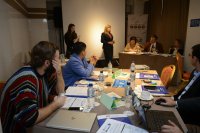 This is the statement by the participants
of the laboratory "Political space for
CSOs: democracy + human rights= sustainable development”.
This is the statement by the participants
of the laboratory "Political space for
CSOs: democracy + human rights= sustainable development”.
The event was held on November 15, 2018 within the framework of the XII International Festival of Human Rights Documentary Films in Bishkek.
Participants were welcomed by Dimitris Christopoulos, president of the International Federation for Human Rights, FIDH (France), who arrived in Kyrgyzstan specifically at the festival, official meetings and interactions with the civil society.
Over 30 participants of the workshop were human rights activists, leaders of CSOs, experts, representatives of the Ministry of Justice of the Kyrgyz Republic, activists from Kyrgyzstan, Kazakhstan, Tajikistan, Italy, France, Czech Republic who worked in the four groups: "Freedom of expression”, "Freedom of assembly”, "Freedom of association”, "Participation of women and migrant workers”. These working groups were created for a discussion of promotion of key liberties required to make political space function and to achieve Sustainable Development Goals. Experts delivered their reports on the situation of these freedoms amid current realities and civil society issues in Central Asia.
"The situation of the freedom of expression is similar in all the three countries – Kyrgyzstan, Kazakhstan and Tajikistan,” Inga Sikorskaya, programme director of the School of Peacemaking and Media Technology in CA (Kyrgyzstan), said presenting her speech on "Freedom of expression in CA: challenges, trends, solutions”. "The main risks are broad interpretation of the laws on inciting hatred, confusion of this interpretation with extremism, which allows prosecuting independent activists, journalists, human rights defenders; growth of hate against socially disapproved groups in our countries, as well as the constantly high level of propaganda, which affects the shaping of public opinion and public discourse.”
For a few hours, working groups were discussing and developing recommendations and action plans. As a result, every team represented their packages of solutions.
Muattar Khaydarova, an expert from Tajikistan, speaking about the trends and risks in the sphere of freedom of association, announced the recommendations worked out by the group of participants specifying the need to improve the laws on financing NGOs from internal sources, emergency adoption of law on charitable organisations, stopping the use of tax law abuse as a leverage on the civil society in Tajikistan.
Gulshaiyr Abdirasulova, a representative of Kylym Shamy (Kyrgyzstan), introduced the audience to the peculiarities of legal proceedings related to the right to freedom of peaceful assembly. The working group with her participation suggested a series of steps to improve of this sphere. In particular, the group recommended developing and introducing a programme on the compliance with the freedom of peaceful assembly into training modules for judges, implementing the process of evaluation of judges and law-enforcement bodies regarding the human rights knowledge, shaping the practice of decision-making by the UN Human Rights Committee, an entity supervising the implementation of the International Covenant on Civil and Political Rights in member states.
Aina Shormonbayeva, president of International Legal Initiative Public Foundation (Kazakhstan) presented recommendations of her group "Participation of women and migrant workers”.
"The governments and the parliament must respond to public interest and demands, which is the key principle of the open political space for CSOs”, Shormonbayeva said. Residents of villages Min Kush, Zhumgal district of Naryn oblast, Kyrgyzstan, arrived specifically to take part in this workshop because they live in an environmentally fragile area due to uranium mining implications, where people suffer from diseases and poverty. The activists recommended that the authorities should handle this situation as soon as possible. Particularly, they recommended developing a special mechanism of enforcement of the decision to relocate the residents of 23 houses in the village of Min Kush.
Ermek Baisalov,an editor of analytical portal CABAR.asia, emphasised the importance of interaction between the expert community and civil society organisations in Central Asia. The expert capacity is a serious basis for joint solution of issues, he emphasised.
The four working groups suggested their action plans to promote the stated freedoms that are needed by the countries to achieve Sustainable Development Goals. Some of suggestions were to obtain the decision of the Plenum of Supreme Court regarding the interpretation of articles related to the incitement of hatred and concerning the freedom of expression in media and on the internet, to adopt the anti-discrimination law of the Kyrgyz Republic in order to protect the rights and freedoms of diverse groups in the society, to adopt the law on charitable organisations, joint work to reduce unemployment and labour migration, to introduce 40 per cent quota for the representation of women in government, to introduce the practice of public hearing of public meeting law enforcement, to encourage the use of UN human rights monitoring mechanisms: use of specific UN procedures, individual appeals to the UN Human Rights Committee, appeals to special UN rapporteurs.
All the recommendations will be sent to the government, parliament, international organisations, media outlets.
The laboratory was organised by the School of Peacemaking and Media Technology in CA jointly with the human rights movement Bir Duino Kyrgyzstan and the representative office of theInstitute for War & Peace Reporting (IWPR) in CA.
A photo report of the laboratory is available on the official page of the XII International Festival of Human Rights Documentary Films on Facebook: http://catcut.net/JWhx
Alina Amilaeva, programme assistant of the School of Peacemaking and Media Technology, Kazakhstan.
The article was prepared by the School of Peacemaking and Media Technology in CA, an official media campaign partner to the XII International Festival.
Statement from Women’s Learning Partnership (WLP) for the 2018 International Festival of Documentary Films on Human Rights Hosted by Bir Duino See video here
How does equality start in the family?
Family relationships—the most intimate and fundamental of all human relationships-- are the foundation for power relations in our societies. Starting from birth, boys are told to be courageous, to take risks, and to be innovative; girls are told to focus their energies on matters within the home, to be submissive and not take up space, and to cede control of their decision-making power.
Discriminatory legislation and cultural practices reinforce this inequality. In the Global South, women face laws that determine their right to choose their partner, travel, hold a job, choose their place of residence, access their inheritance, or make decisions about their bodies and/or their children. In the Global North, they must contend with laws limiting reproductive rights, equal pay for equal work, maternity leave, and adequate childcare. Such legislation strips women of power within the family unit, limiting their opportunities and making them susceptible to violence and human rights violations.
The unequal status conferred upon women and girls within the confines of the family robs them of their agency, hindering their ability to reach their full potential in education, livelihood, and civic and political life. To create equality for women in all these spaces, we must begin with the family.
Why is this topic important and relevant in the world today?
WLP partners have been working to amend inequality in the family in their respective countries for years. They have led campaigns for change on issues most important to them, such as equal citizenship rights in Lebanon, honor crimes in Jordan, land rights in Morocco, and abortion rights in Brazil. By conducting research, raising awareness among the public and policymakers, and empowering women to be inclusive leaders, they have amplified the voices of women on the ground and identified grassroots priorities around family law reform.
Now, in our globalized society with increasing conflicts and various forms of social and economic crises, we believe more than ever in the necessity of an international movement to address inequality in the family and its repercussions in public spaces within societal institutions. Although the circumstances are specific to each cultural context, women and girls in all parts of the world face fundamentally similar challenges that stem from a lack of power, respect, and opportunity within the family unit. By leveraging the linkages among countries and building global solidarity, we can more effectively tackle these problems and transform our communities and societies.
What does the research say about inequality in the family in different countries?
WLP conducted extensive research on the topic
of discriminatory family laws and feminist advocacy to reform them. Eight
country case studies from Brazil, India, Iran, Lebanon, Nigeria, Palestine,
Turkey, and Senegal examined diverse approaches to activism. Essays and expert
interviews from women leaders in Jordan, Egypt, and Morocco provided additional
contextual analyses and firsthand accounts of successful advocacy
campaigns. Some of the main conclusions
from WLP’s research effort include:
·Family laws, whether stemming from religious or secular justifications, are social and political constructs that can be changed.
·Because the reactions, obstacles, and outcomes to changes in family laws are unpredictable, it’s important for advocates to monitor and evaluate these developments.
·Advocacy campaigns should reflect the cultural, social, and political environments in which they are being conducted. They should adopt a multi-pronged approach: building coalitions, finding allies from different stakeholder groups, and influencing public opinion.
·Building coalitions among diverse women’s groups, as well as with other civil society groups, will provide greater legitimacy to women’s demands. These coalitions should seek allies within and outside the state in order to be most effective.
·By connecting with women’s organizations outside of their countries and engaging in transnational networking around common issues, women’s groups can shape an international policy environment friendly to family law reform. This in turn will likely influence national policy debates, putting pressure on national lawmakers to consider reform.
What is WLP’s strategy for change on the global level?
With their collective experience, WLP partners and their allies are initiating a campaign to pave the way for reform. The Equality Starts in the Family campaign will advocate for gender equality within and outside the home so that women and girls are afforded equal rights and opportunities in all walks of life.
The campaign is designed on the premise that any solution to gender discrimination has to address both legislation and cultural understandings for change to be implemented. As such, the campaign focuses on both reforming discriminatory family laws that are the foundation of the unequal status of women and girls in the family, and changing the culturally determined structures, roles, and beliefs that perpetuate gender discrimination.
Together with activists, scholars, policymakers, INGOs, grassroots organizations, and concerned individuals, WLP will produce and distribute tools for advocacy; conduct culturally-contextualized workshops on advocacy in this area; raise awareness among the public and policymakers on the ways in which discriminatory family laws perpetuate violence and inequality; and raise the visibility of the activists working to reform such laws.
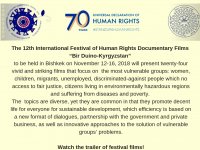 The 12th International Festival of Human Rights
Documentary Films "Bir Duino-Kyrgyzstan” to be held in Bishkek on November
12-16, 2018 will present twenty-four vivid and striking films that focus on the
issues of the most vulnerable groups: women, children, migrants, unemployed,
discriminated-against people and people with no access to fair justice, people
living in environmentally hazardous regions and suffering from diseases and
poverty. The topics is diverse, yet they are common in that they promote decent
life for everyone for sustainable development, which
efficiency is based on a new format of dialogues, partnership with the
government and private business, as well as innovative approaches to the
solution of vulnerable groups’ problems.
The 12th International Festival of Human Rights
Documentary Films "Bir Duino-Kyrgyzstan” to be held in Bishkek on November
12-16, 2018 will present twenty-four vivid and striking films that focus on the
issues of the most vulnerable groups: women, children, migrants, unemployed,
discriminated-against people and people with no access to fair justice, people
living in environmentally hazardous regions and suffering from diseases and
poverty. The topics is diverse, yet they are common in that they promote decent
life for everyone for sustainable development, which
efficiency is based on a new format of dialogues, partnership with the
government and private business, as well as innovative approaches to the
solution of vulnerable groups’ problems.
Watch the trailer of festival films!
The School of Peacemaking and Media Technology is the official media partner of the festival.
This innovative approach was suggested by Inga Sikorskaia, director of School of Peacemaking and Media Technology on October 26 in Astana (Kazakhstan) at the conference "New challenges and approaches to regional and global security in Central Asia”.
Based on researches and proprietary developments of training programmes, the expert has emphasised that one of the methods of youth de-radicalisation can be education and raising awareness of the younger generation, teaching it the skills of information literacy, development of critical thinking and forming new media culture. This helps them better understand the legitimacy of extremist views and their narratives, be resistant to propaganda.
"When countering radicalisation, our young people must have skills of perceiving conflict-sensitive content and rules of responding to it, must be able to detect hate speech, which is a negative content, in information consumed, and illegal information, extremist propaganda and media xenophobia that leads to violence,” I.Sikorskaia said.
The new media culture is a special type of culture in the digital age, when disintermediation prevails, no boundaries between traditional and social media information exist, which has caused the new type of thinking that is characterised by information awareness, skills of its creation and distribution. These two aspects make us look at media culture at a new angle and use it as a tool of deradicalization.
The main five elements of the new media culture are: culture of information consumption, dissemination, perception, analysis and media creativity. Mastering the culture of information consumption is a key factor that shows how audience perceive distributed information, including radical narratives, his level of critical perception and level of trust to information received and its further use.
According to I.Sikorskaia, the culture of information consumption enables development of further skills of media creativity and easy orientation in the rich information environment. "A young user that has all of the above skills can independently deconstruct radical narratives in information that contains extremist propaganda, and can help his peers to do that,” she emphasised, "while good education and good competencies will help create conditions that will hinder the ideology of violent extremism, its distribution and improve resistance of students to radical narratives.”
It can be achieved via a content-based aspect of education, introduction of flexible modules and teaching techniques.
The expert has presented a package of recommendations, some of which are to separate training and retraining of teachers in the standards and techniques of using skills of information literacy and new media culture, inclusion of five elements of new media culture and information literacy into general syllabuses, providing access to media education to vulnerable groups exposed to recruitment, via flexible modules designed to motivate and involve young people in projects to be implemented in their communities and some others.
Since now ideology is used by recruiters via new media and internet, the knowledge of creation, receipt, distribution, critical analysis, verification of information and communications in the digital sphere must become mandatory.
The event was held with participation of some experts from Central Asian region, Afghanistan, Europe and the United States, scholars, representatives of the diplomatic corps with the support of the OSCE Programme Office.
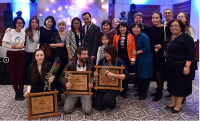 Over 450 documentary films from different countries of the world have been
demonstrated during 11 festivals held in Kyrgyzstan, including documentaries
from Eastern European and Central Asian countries. All films have been designed
to raise legal awareness and encourage directors that make films about acute
social problems and human rights.
Over 450 documentary films from different countries of the world have been
demonstrated during 11 festivals held in Kyrgyzstan, including documentaries
from Eastern European and Central Asian countries. All films have been designed
to raise legal awareness and encourage directors that make films about acute
social problems and human rights.
Tolekan Ismailova, leader of human rights movement Bir Duino Kyrgyzstan, founder of film festival, has made examples of past festivals that emphasised the importance of such events in Kyrgyzstan.
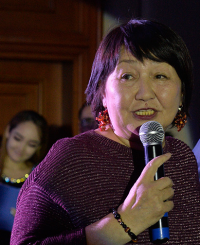 Photo of the 11th international festival of
documentary films
Photo of the 11th international festival of
documentary films
Tolekan Ismailova:
It was the 2010 festival, when we witnessed the dependency of our government from foreign policy. They prohibited the screening of documentary "10 conditions of love” about the fate of the prominent human rights activist, head of the World Uighur Congress, Rabiya Kadyr. Ex-head of the presidential administration of the Kyrgyz Republic, Emil Kaptagaev, said that it was the intelligence agencies that prohibited the screening saying the embassy of the People’s Republic of China in the Kyrgyz Republic was dissatisfied with it.
We appreciate the visits of our leading experts from various countries of the world, and we were especially impressed by the visit of Igor Blazhevich, ex-director of international festival of human rights documentary films "One World”, from Prague who came twice. He emphasised our festival was a folk festival! It involves active young people and leaders. We have the future! They are creative and free from stigma. Since the festivals topics always raise the most painful problems of vulnerable people, we are always aware of what happens in the world and we have a chance to prevent conflicts and focus on high principles and standards of human rights and liberties in terms of sustainable development.
 And the third important thing is not only about
watching and discussing films, but also about a wide platform for partnership
and solidarity, sharing experiences, civic bridging. The key thing here is the
development of the Kyrgyz language as all documentaries come with captions in
different languages. This is a festival
for everyone!
And the third important thing is not only about
watching and discussing films, but also about a wide platform for partnership
and solidarity, sharing experiences, civic bridging. The key thing here is the
development of the Kyrgyz language as all documentaries come with captions in
different languages. This is a festival
for everyone!
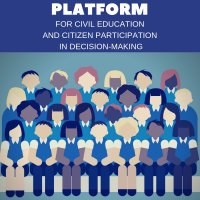 During the 12thinternational festival of human rights documentary films "Bir Duino
Kyrgyzstan-2018”, innovative laboratories and master classes will be held on topical
issues in the framework of Sustainable Development Goals consistent with a human
rights-based approach. Current global challenges of political and religious
fundamentalism, violent extremism and terrorism have become a threat to public
security, obstacles to peaceful co-existence and barriers to sustainable
development for many countries in the world.
During the 12thinternational festival of human rights documentary films "Bir Duino
Kyrgyzstan-2018”, innovative laboratories and master classes will be held on topical
issues in the framework of Sustainable Development Goals consistent with a human
rights-based approach. Current global challenges of political and religious
fundamentalism, violent extremism and terrorism have become a threat to public
security, obstacles to peaceful co-existence and barriers to sustainable
development for many countries in the world.
The labs will be held in November 13 to 15, 2018 in Bishkek.
The participants of events will be working over the tools and recommendations on empowerment of children, labour rights, cases of torture in penal setting.
The Global Storm: Growing Fundamentalism and Threats to the Future laboratory will focus on the issues of equality and human dignity; human rights defenders will discuss the financial literacy issues and the impact of Kyrgyzstan’s foreign debt on sustainable development. Jointly with the Bishkek mayor’s office Agency for Development, a workshop "Cities to Cities: The Role of Citizens, Partnership for Development” will be organised; while the Forum of Women’s NGOs, together with other organisations, will discuss "How to become a master of your own country?” by applying global experience of sustainable development with a human rights-based approach.
Master class on innovations in documentary films will be held by leading documentary filmmakers from Eastern Europe and Central Asia, and the laboratory of the Coalition for Equality will focus on raising awareness about the principles of equality and non-discrimination.
The last day of the festival will be dedicated to the development of political space for civil society organisations. The School of Peacemaking and Media Technology, together with key partners, will hold this workshop based on the following principle: democracy + human rights + fair and open government and equal partnership = sustainable development.
"The format of labs this year differs from the previous year’s as they are focused on topical issues,” said Lira Asylbek, director of Alternative Centre. - Workshops give an opportunity to key experts, representatives of civil society, CSOs, and authorities to focus on key present-day challenges, to understand what and who impedes the implementation of human rights, what happens around, how to mitigate these threats, which countries have successful outcomes of positive changes, and how to build equal partnership with the government, business entities for positive changes.”
Sharing experience, opinions, joint work over social problems will help find best innovative approaches and solutions. IT will also play its unique role in this process.
The programme of laboratories is here
More Information about the human development configuration
People: Human development focuses on improving people’s lives,
not just on the assumption that economic development automatically leads to social
welfare for all. Growth of income is seen as a means for development, not the outcome.
Opportunities: Human development gives people more freedom to live an
important life. In fact, it means to develop people’s skills and to enable them
to use these skills. For example, training helps shape skills, but they will be
useless if a person doesn’t have a job or their skills don’t fit the local
labour market needs. Human development is based on three components: a person
must live a long, healthy and creative life, must be well-informed and must
have access to resources that ensure a decent life.
Right of choice: Human development is based on a wide choice. People are given opportunities; however, they don’t have to use them.
No one can guarantee happiness to a person; every person makes their own choice based on their own decision. The process of development – human development – must at least create an environment for people, individually and collectively, to enable the development of their potential in full and to create reasonable opportunities for them to live a productive and creative life.
The School of Peacemaking and Media Technology is official partner of Fest-2018 on media campaign.
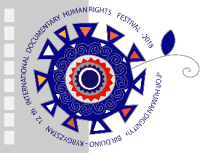
The 12th International Festival of Human Rights Documentary Films 2018 "For human dignity!” is dedicated to the 70th anniversary of the UN Universal Declaration of Human Rights will be held under the slogan "Today we work for tomorrow!”.
The annual festival organised by Bir Duino-Kyrgyzstan will take place in Bishkek in November 12-16, 2018.
55 films of 18 countries such as Kyrgyzstan, Norway, Sweden, China, Czech Republic, Switzerland, Russia, Germany, Poland, Belgium, USA, Australia, India, United Kingdom, Canada, Ukraine, Paraguay, Republic of South Africa have been submitted to the festival. The committee has selected 24 most vivid and striking films.
This year, the scenarios of documentary films focus on the problems of children, women and vulnerable groups, on torture in closed institutions, on migrants, discriminated-against people who have no access to fair justice. The films also tell about citizens who live in environmental hazardous regions and suffer from diseases and poverty. These topics is diverse, yet they are common in that they promote decent life for everyone.
This year, the idea of the festival has been supported by the Bishkek Mayor’s Office, local authorities. The films will be shown for free to anyone in every district of the city, in cinemas Manas, Rossiya, Oktyabr, Ala-Too. Following every film, producers will meet the audience to talk with them and answer their questions. Together with the audience, the films will be discussed with the characters of films, representatives of authorities, experts and journalists. All recommendations by results of this discussions will be submitted to government agencies, national human rights institutions and spread via solidarity networks.
On the last day of the festival, non-competition films will be shown that reveal various discrimination issues and social injustice faced by communities with intersecting identities.
"We are proud to have this festival for several years – this is not a project, but a joint volunteer work of likeminded people, activists, artistic people and human rights defenders,” Tolekan Ismailova, director of human rights movement Bir Duino Kyrgyzstan, said. "Today, in search of new approaches, innovative ways, we try to make an efficient contribution to the Sustainable Development Strategy with the human rights agenda and gender equality.”
The film festival takes place during new initiatives by the Kyrgyzstan’s authorities aimed at supporting small and medium enterprises in regions, attracting investments, and stepping up the efforts of financial institutions and funds that provide loans for projects address economic development and job creation.[1]
10 innovative labs and master classes will be held within the festival in terms of sustainable development goals, whose achievement is possible only through partnership with the government and private business, as well as through creative approaches to solution of vulnerable groups’ problems. The labs will create a platform for civil education, encouragement of citizens’ participation in decision-making, will contribute to the new development policies, including at the domestic level, promoting the good governance principles in the Kyrgyz Republic[2]. These workshops will be carried out by prominent foreign and regional experts under the auspices of national and international partners of Bir Duino Kyrgyzstan. And a Kazakhstan-based media group Partizanskoye Kino [Guerrilla filmmaking] will share its experience during the master class for documentary film makers.
For information: The international festival of human rights documentary film is an active civic platform that has been raising key issues of rights and liberties in a changing world since 2007. This is a unique festival in Central Asia that provides a great opportunity to discuss documentary truth in the human rights sphere by involving filmmakers from different countries.
The Universal Declaration of Human Rights, which 70th anniversary is being celebrated this year, was adopted by the UN General Assembly on December 10, 1948[3]. This document declares interdependence of civil, cultural, economic, political and social rights that every person has.
The School of Peacemaking and Media Technology is the official media partner of the festival.
For more information see: www.birduino.kg
https://www.facebook.com/birduinofest/?notif_id=1540181629171346¬if_t=page_admin&ref=notif
E-mail: birduinokyrgyzstan@gmail.com тел: +996312 383330
 Inga Sikorskaia was closely checked at the border 19 times.
Inga Sikorskaia was closely checked at the border 19 times.
Inga, a program director for the School of Peacemaking and Media Technology in Central Asia is constantly detained by the border control bodies when passing through passport control at Kyrgyzstan’s border.
She specialises in investigative journalism, media studies for freedom of expression, trainings for journalists and activists on countering hate speech and extremists’ propaganda in the media, public discourse, including in conflict areas. Sikorskaia has told to Kaktus.media about the border checks her person during her business trips she has faced for 19 times this year.
"The order was to inform!” a border officer said when he was verifying my data in the electronic system after I showed him my passport at the control zone at the International Manas Airport in Bishkek (Kyrgyzstan) on June 16, 2018. Then they took my passport somewhere without explanation. Nobody explained anything to me. When they gave my passport back after half an hour and I was checked again, the story repeated. The border officer said that my document needed to be checked again. In fact, I went through the border control procedure twice. They gave me the document only after I made a phone call to my colleague who addressed the border service. I passed through passport control when boarding was almost complete.
Moreover, after this complicated check, the photo on my international passport was damaged – ripped off by one third. But I learned about this later: I did not check the passport pages because I was in a hurry to board the plane. Upon arrival in Almaty, the Kazakh border officer pointed out this defect to me and agreed to let me in only after I had shown my internal passport to him.
It was for the 19th time since May 2017, when I was thoroughly checked at checkpoints, where my name was blacklisted, or as local border officers call it, a "secondary” special register.
I don’t mean those whose freedom of movement can be restricted by law, for example, during an investigation, or those debtors who are under travel restrictions, offenders or child support payers. After all, neither my organisation nor I am involved in any court cases. It seems that our country makes blacklists based on the experience of neighbouring repressive states, and listing independent journalists, civil activists, and human rights defenders there.
From my experience when I worked as a senior editor on Turkmenistan and Uzbekistan for the Institute for War and Peace Reporting, I remember great problems of my colleagues from these countries who were on the blacklist. As a result, they are either restricted to leave the country for many years, or are exposed to direct violation of their civil rights upon leaving or returning to the country.
All of my 19 cases when it took me a long time to pass passport control, when officers asked me to step aside, sit and wait (until my border crossing was agreed and registered?), I travelled from Kyrgyzstan to Europe and Central Asian countries to international conferences organised by the OSCE , UN, other international and partner organisations. I delivered reports on the freedom of expression, xenophobia and countering the propaganda of extremism there, presented media researches, held trainings on the tools of monitoring the right to non-discrimination in the public sphere, trainings for journalists, researchers, and human rights activists.
This March, during my trip to Brussels for an OSCE/ODIHR event, in addition to time-consuming examination and scanning of my passport, my small suitcase with a lock that was checked did apparently undergo a real attack in my absence. Upon arrival in Brussels, I received it cut, without a lock, with things all mixed up. Other participants of the event, who saw my suitcase initially at the Manas International airport in Bishkek, were not even surprised. They travel with hand luggage only, also because some inappropriate things could be placed inside luggage and used against them.
Last year, when I was passing the border, I was asked weird questions about whether I had bank debts or whether I was wanted by police. Next time, they took my passport for a long time, and when I asked them to give my document back they wondered, "Why, didn't we give it to you?” When I was crossing the land border at the Kyrgyz- Kazak Ak-Zhol checkpoint in the autumn of 2017, the officers took my passport away, locked the doors on both sides and left me in the room.
I consider such a strict control over my movements as unjustified attempts to restrict my constitutional freedom. I have already addressed the State National Security Committee [GKNB] and the border service of the Kyrgyz Republic, while the group of lawyers of the School of Peacemaking and Media Technology collect documentary justifications for further actions.
 UN Committee on the Elimination of
Racial Discrimination recommends Kyrgyzstan to combat racist media coverage and
incidents of hate speech against ethnic minorities.
UN Committee on the Elimination of
Racial Discrimination recommends Kyrgyzstan to combat racist media coverage and
incidents of hate speech against ethnic minorities.
School of Peacemaking and Media Technology in CA, an entity focusing on the research of hate speech and discrimination in the media and public discourse, media development, and encouragement of diversity, calls on the authorities, media entities of Kyrgyzstan, and civil society to pay attention to the concluding observations of the UN Committee on the Elimination of Racial Discrimination.
On May 11, 2018, by results of the regular session the members of the UN Committee published concernsand recommendations after listening to the periodic report of Kyrgyzstan.
Human rights entities of the country also delivered their alternative report.
The meeting was held from April 23 to May 11, 2018 in Geneva.
Having studied the reports, the UN Committee has recommended that the authorities of Kyrgyzstan should take necessary measures to combat racist media coverage and incidents of hate speech committed including by politicians and other public figures, and ensure that such cases are thoroughly investigated and, where appropriate sanctions be imposed.
"The Committee is concerned about the prevalence of stereotyping and stigmatization of ethnic minorities, including Uzbeks, Turks, Uighurs and Mugat, as well as the incidence of hate speech against them in the media and by public and political figures”, as reads the section "Hate speech and ethnic profiling” of the concluding observations of the UN Committee on the Elimination of Racial Discrimination.
School of Peacemaking and Media Technology in CA for the last 7 years has held regular monitoring and research of hate speech that indicate the established trends of hate speech use against various groups.The stereotypic coverage of ethnic issues by local media has led to the transmission of discriminatory language spoken by public speakers or respondents against minorities by journalists. The development of internet has expanded the opportunities of the freedom of expression and increased the spread of nationalistic expressions.
No clear understanding of the difference between the negative-value and unlawful (criminalized) content in publications, which can lead to hate speech crimes, is the result of low awareness and education in ethics and combating intolerance and also low awareness of political, social and cultural rights of ethnic minorities guaranteed by the Kyrgyz Constitution. These factors influence the capability of the media to objectively raise the sensitive issues of ethnic minorities, which leads to even greater stereotyping, stigmatization, thus making the minorities invisible and aloof from society.
Kyrgyzstan has some experience of encouragement of ethnic, linguistic and cultural diversity through the media developed by local experts. We urge that these practices be introduced into educational and outreach campaigns on media literacy, that we keep on raising awareness and skills of journalists, media workers, communication experts, counsellors, activists in order to reduce the incidence of hate speech and incitement to hatred.
Among other recommendations by the UN Committee for Kyrgyzstan have been: to expedite the adoption of anti-discrimination law, to take effective measures to ensure that journalists and human rights defenders (including those working on the rights of ethnic minorities), are able to carry out their work effectively without fear of reprisal, to strengthen awareness-raising campaigns, to combat ethnic or racial stereotypes and stigma with a view to promoting tolerance and understanding.
 On March 29, 2018, a working discussion meeting was
held with participation of the representatives of media, civil society and
state bodies to discuss the recommendations on countering the propaganda of
extremism developed by the experts of the project "Combating the propaganda of violent extremism through media andawareness” on the basis of media monitoring.
On March 29, 2018, a working discussion meeting was
held with participation of the representatives of media, civil society and
state bodies to discuss the recommendations on countering the propaganda of
extremism developed by the experts of the project "Combating the propaganda of violent extremism through media andawareness” on the basis of media monitoring.
The participants were provided with the findings of the media research "Islamophobia and Propaganda in Online Media and Social Networks of Kyrgyzstan”, where experts have emphasised the alarming trend when media outlets draw parallels between the Islam and extremism. In 60 per cent of articles analysed, authors mentioned Islam even when neither the Islamic religion, nor extremism was the topic of the story. Thus, a narrative connection is created between the Islam and extremism, fear is imposed on the audience, and Islamophobic public discussions are encouraged.
Among main recommendations that can help mitigate the consequences of a negative discourse are the need to use peacemaking approaches to overcome hate speech in media, which can be an early prevention of the spread of extremists’ propaganda, to work constantly to reduce the discriminatory language used in the media and on the internet.
Project experts think that such measures will create the conditions for effective and quick response to the radical discourse.
See recommendations here.
The event was organised by School of Peacemaking and Media Technology in CA under the project "Combating the propaganda of violent extremism through media and awareness” funded by the U.S. Embassy in Bishkek.

The School of Peacemaking and Media Technology in Central Asia announces an annual competition among students from Kyrgyzstan, Kazakhstan,…

25 journalists and media workers from various regions of Kyrgyzstan have been trained to counter the propaganda of violent extremism and hate in…